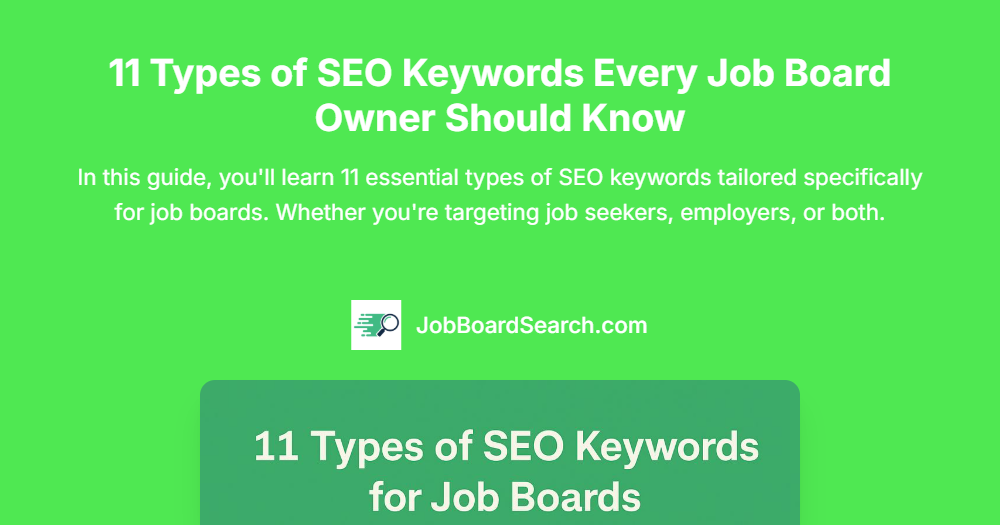If you're running a job board and struggling to get organic traffic, the problem might not be your platform, it might be your keyword strategy.

SEO isn't just about stuffing job listings with random search terms. It's about understanding search intent and aligning your content and categories with the right keywords.
In this guide, you'll learn 11 essential types of SEO keywords tailored specifically for job boards. Whether you're targeting job seekers, employers, or both.
1. Short-Tail Keywords
These are broad, general keywords made up of one or two words. They're often highly competitive and vague but can bring in a large volume of traffic.
- Why it matters: Great for category pages or high-level topic overviews.
- Example:
marketing jobs,developer jobs,remote jobs
Tip: Target short-tail keywords only if your domain has authority or combine them with long-tail variations.
2. Long-Tail Keywords
Long-tail keywords are longer phrases (3+ words) that are more specific and usually less competitive. They attract users with clear intent.
- Why it matters: These are gold for niche job boards or specialized listings.
- Example:
remote digital marketing jobs for beginners,part-time UX designer jobs from home
Tip: Use these in blog posts, filtered search pages, or landing pages for better conversions.
3. Branded Keywords
These are searches that include your job board's name. They usually come from people who already know you or are returning users.
- Why it matters: Shows brand recognition and trust.
- Example:
JobBoardSearch developer jobs,JobBoardSearch UX internships
Tip: Ensure your homepage, social profiles, and GSC (Google Search Console) reflect your brand to rank for these.
4. Non-Branded Keywords
These are generic job-related terms that don’t include your brand. They're essential for reaching new audiences.
- Why it matters: Helps attract first-time users who are still discovering job board options.
- Example:
freelance writing jobs online,entry-level IT jobs
Tip: Focus content, blog posts, and job titles around non-branded keywords for growth.
5. Buyer Intent Keywords (for Recruiters)
These are the keywords employers and recruiters use when they’re ready to take action—like posting a job.
- Why it matters: This is where the money comes from. These are high-converting keywords for paid users.
- Example:
post a job for remote designers,hire freelance developers
Tip: Create dedicated landing pages targeting these terms and optimize your pricing or sign-up funnel.
6. Informational Keywords
These are used in blog posts, guides, or FAQs to answer job seekers' or employers' questions.
- Why it matters: Builds topical authority, drives consistent organic traffic, and increases trust.
- Example:
how to write a UX designer resume,best job boards for remote jobs
Tip: Use these to build content clusters or evergreen blog posts that funnel readers into your listings.
7. Navigational Keywords
These are searches where the user already knows your site and wants to go directly to a specific section or page.
- Why it matters: Indicates brand familiarity and site usability.
- Example:
JobBoardSearch submit job board
Tip: Structure your site so these terms appear in page titles, URLs, and navigation.
8. Transactional Keywords (for Job Seekers & Employers)
These keywords imply that the user is ready to take an action—apply, hire, post, or list.
- Why it matters: These users are high-intent and ready to convert.
- Example:
apply for software engineering internships,list a remote job
Tip: Use clear CTAs and optimized landing pages to capture this intent.
9. Geo-Targeted Keywords
Location-based keywords are essential for local job boards or remote jobs filtered by city/region.
- Why it matters: Searchers often look for jobs near them or in a specific region.
- Example:
remote jobs in Berlin,tech jobs in Toronto
Tip: Build location-specific pages or filters on your site for better relevance and rankings.
10. LSI Keywords (Latent Semantic Indexing)
These are conceptually related terms that help search engines understand content relevance.
- Why it matters: Boosts your SEO by showing topical coverage.
- Example: If your page targets
data analyst jobs, LSI terms could includebusiness intelligence,data visualization, orSQL jobs.
Tip: Use LSI keywords naturally in job descriptions, blog content, and meta descriptions.
11. Competitor Keywords
These are keywords that competing job boards rank for. By analyzing them, you can discover keyword gaps or opportunities.
- Why it matters: Helps you understand where you're falling short and how to compete better.
- Example:
We Work Remotely marketing jobs,AngelList developer jobs
Tip: Use SEO to reverse-engineer competitors' strategies.
Final Thoughts: Understanding these 11 keyword types gives you a powerful SEO toolbox for growing your job board organically. From attracting job seekers to converting paying recruiters, aligning your content with the right keyword intent can make all the difference.
🔍 Want to dig deeper? Explore our free Keyword Research Tool For Job Boards to find keywords that match your niche!





